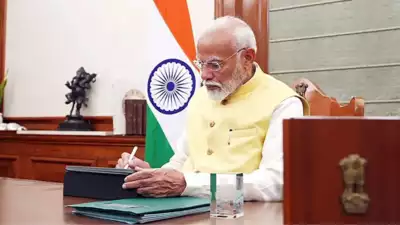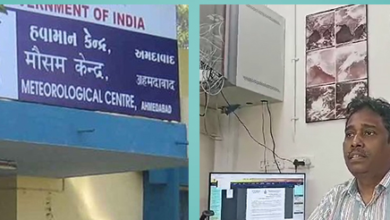
A day after taking oath of office for a historic third consecutive term, Prime Minister Narendra Modi on Monday assigned portfolios to his 71 council of ministers.
The new Union Cabinet held its first meeting at the PM’s residence in the evening following which the full list of portfolios was released.
Signalling continuity, Prime Minister Narendra Modi on Monday retained four of his high-profile ministers Amit Shah, Rajnath Singh, Nirmala Sitharaman and S Jaishankar of Home, Defence, Finance and External Affairs respectively in his new government.
The four ministers in charge of these portfolios make up the crucial Cabinet Committee on Security headed by the prime minister.
Among new entrants to the Union Cabinet, former Madhya Pradesh chief minister Shivraj Singh Chouhan has got Agriculture and Rural Development Ministries, while BJP president J P Nadda has returned to the Health Ministry, a portfolio he had held in the Modi government’s first term before he took charge of the ruling BJP first as working president in 2019 and then as the full-fledged president in 2020.
The four ministers in charge of these portfolios make up the crucial Cabinet Committee on Security headed by the prime minister.
Among new entrants to the Union Cabinet, former Madhya Pradesh chief minister Shivraj Singh Chouhan has got Agriculture and Rural Development Ministries, while BJP president J P Nadda has returned to the Health Ministry, a portfolio he had held in the Modi government’s first term before he took charge of the ruling BJP first as working president in 2019 and then as the full-fledged president in 2020.
The PM Modi 3.0 council of ministers include representation from all corners of the country as well as social groups.
It has 27 ministers from Other Backward Classes, 10 from Scheduled Castes, 5 from Scheduled Tribes and 5 from minorities.
A record 18 senior ministers will be heading ministries.
Modi Cabinet 3.0 includes 43 ministers who have served 3 terms or higher in Parliament, with 39 having been ministers in central government before. The list includes multiple former chief ministers and 34 ministers who have served in state legislatures and 23 having worked as ministers in states.
There are also 33 first-timers in the ranks. Seven first-time ministers in the Modi government belong to the allies: TDP’s K Rammohan Naidu and Chandrasekhar Pemmasani; JDU’s Lalan Singh and Ram Nath Thakur, RLD’s Jayant Chaudhary, LJP’s Chirag Paswan and HD Kumaraswamy of the JD(S).
The new faces also include Suresh Gopi, the actor-turned-politician who scripted history by becoming the first BJP MP from Kerala.
BJP’s NDA partners have got five cabinet ministerial berths this time, as against none in the outgoing government, given the party’s dependence on allies for a majority in the Lok Sabha. While the outgoing council of ministers had two ministers of state from BJP’s allies — Anupriya Patel of the Apna Dal (S) and Ramdas Athawale of the RPI(A) — this time, there are two ministers of states with independent charge and four ministers of state (MoS).
As per the Constitution of India, the total strength of the council of ministers cannot exceed 15% of the total number of lok sabha MPs.
The Strength of the 18th Lok Sabha is 543 Members and hence the council of minsters cannot be more than 81.
The 2024 Lok Sabha election results were announced by the Election Commission of India on June 4, the BJP won 240 seats and the congress 99 seats. BJP had won 303 seats in the 2019 general elections and 282 seats in the 2014 general elections.
The NDA’s tally is 293 seats — well above the majority mark of 272 — and opposition INDIA bloc 234.




